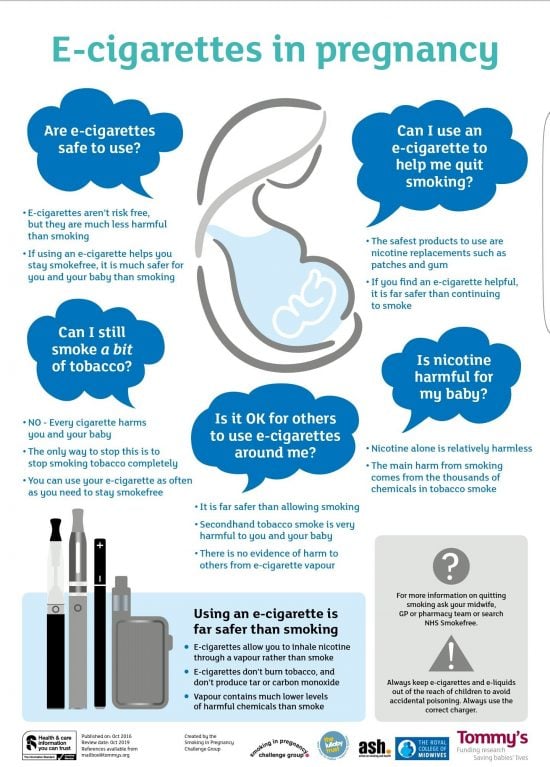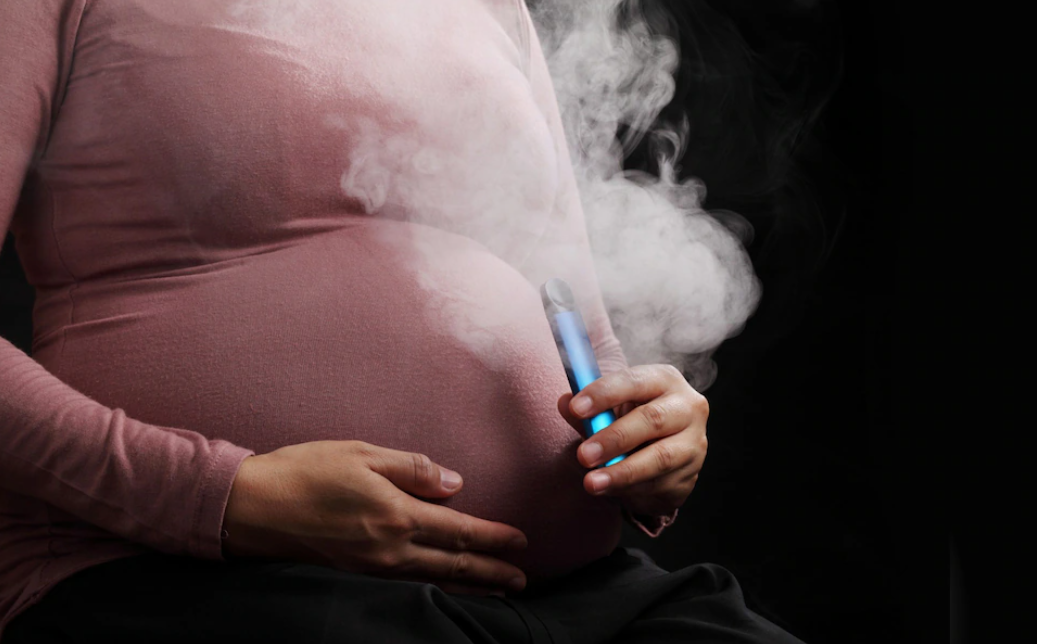Previous Understanding of Vaping During Pregnancy
A review from the British Journal of Midwifery (BJM) (2021) focused on the use of e-cigarettes in smoking cessation during pregnancy to “assess the extent of midwives’ current knowledge and attitudes.”
Summarising a paper (2018) used in their research, they found that vapes were viewed in a positive light by pregnant women and seen as less harmful than smoking. However, the perceived social stigma on them meant that some felt uncomfortable using vapes in public, especially when pregnant and that there were concerns about the safety of them and nicotine dependence. They added that midwives should provide pregnant women with up-to-date info and advice, and consider the influence of social stigma.
Concluding on their review, the BJM said “It is important to identify the knowledge and attitudes held by this group of professionals in relation to vaping, and the influence that this has on their practice, as midwives are in regular direct contact with pregnant women who choose to smoke or vape, and as such may significantly impact upon the informed decisions made by pregnant women in relation to smoking cessation practices during pregnancy.
“There is a clear gap for this research, which will potentially add more depth to the current literature on e-cigarettes as a smoking cessation strategy in pregnancy.”
In 2019, the National Centre for Smoking Cessation and Training stated that “if a pregnant woman chooses to use an e-cigarette to replace conventional smoking, she should not be discouraged from doing so by her midwife, as it is safer for an expectant mother than continuing to smoke.
“E-cigarettes are fairly new products and as such we don’t yet have evidence about the effects of longer-term use and any risks to unborn babies. The vapour produced by e-cigarettes contains some toxicants; these are either at much lower levels than those found in tobacco smoke or at levels not associated with serious health risk.”
The Royal College of Midwives (RCM) stated that based on available evidence, there is no reason to believe that use of e-cigarettes has any adverse effects on breastfeeding, and “whilst nicotine from vaping can cross the placenta, e-cigarettes do not contain as many toxic ingredients as conventional cigarettes do. This, e-cigarettes carry a smaller risk of harm to the health of the foetus.” The RCM said that there were strong reasons for testing the safety and efficacy of e-cigarettes as a smoking cessation tool for pregnant women.

Current Understanding
Recently, UK researchers at Queen Mary University in London say vaping is safe for both women and babies in pregnancy, based on a study of over 1100 women across 23 hospitals in England and 1 stop-smoking service in Scotland.
Measurements of the participant’s saliva levels were taken at baseline and then towards the end of pregnancy. Researchers also collected information regarding their use of cigarettes, types of NRT (Nicotine Replacement Therapy), respiratory symptoms and date of their babies at birth, including birth weight.

Lead researcher of the study, Professor Peter Hajek, said the results suggested vapes could be used safely in pregnancy to help people quit smoking.
“The trial contributes answers to two important questions, one practical and one concerning our understanding of risks of smoking. E-cigarettes helped pregnant smokers quit without posing any detectable risks to pregnancy compared with stopping smoking without further nicotine use.
Using nicotine-containing aids to stop smoking in pregnancy thus appears safe. The harms to pregnancy from smoking, in late pregnancy at least, seems to be due to other chemicals in tobacco smoke rather than nicotine.”
Professor Peter Hajek
While the results should reduce some of the concerns about using nicotine replacements while pregnant, the authors of the study said further studies are needed to verify. Although vapes are accepted as a safer alternative for pregnant smokers, non-smokers are advised not to start using the devices during pregnancy due to limited research on their safety. Another limitation they noted was that due to the small size of the study, some rarer pregnancy complications could have been missed.
Current evidence on e-cigarettes indicates they are much less risky than smoking. “E-cigarettes do not produce tar or carbon monoxide, the 2 main toxins in cigarette smoke. Carbon monoxide is particularly harmful to developing babies.” Unlike nicotine replacement therapy, e-cigarettes are not available on an NHS prescription.
Experts Commentating on the Study
Professor Tim Coleman from the University of Nottingham’s Smoking in Pregnancy Research Group, which led trial recruitment said:
“Smoking in pregnancy is a massive public health problem and nicotine-containing aids can help pregnant women to stop smoking, but some clinicians are reticent about providing NRT or e-cigarettes in pregnancy. This studies provides further, reassuring evidence that tobacco smoke chemicals rather than nicotine are responsible for smoking-related harms, so using nicotine containing aids to quit is vastly preferable to continuing to smoke when pregnant.”
Professor Tim Coleman
Professor Linda Bauld, Bruce and John Usher Chair in Public Health at the University of Edinburgh and a study co-investigator said:

“Clinicians, pregnant women and their families have questions about the safety of using nicotine replacement therapy (NRT) or e-cigarettes during pregnancy. Women who continue to smoke during pregnancy often find it difficult to stop but products like NRT or e-cigarettes can help them to do so. These results suggest that NRT or vaping can be used as part of a quit attempt without adverse effects. Our findings should be reassuring, and provide further important evidence to guide decision-making on smoking cessation during pregnancy.”
Professor Linda Bauld
Professor Jamie Brown, Director of the Tobacco and Alcohol Research Group, and Professor of Behavioural Science, University College London, said:
“Smoking in pregnancy is dangerous, and many people want to quit and reduce these risks. E-cigarettes are an effective way for people to quit smoking and these new findings may ease some worries of pregnant smokers who want to use them to quit smoking.
An earlier analysis of this trial found a similar safety profile between those who were randomly given e-cigarettes compared with those given nicotine replacement therapy to quit smoking, but this may have resulted from a difference in the actual usage of the two products. This new study analysed the comparative safety based on their actual use, although this meant the two groups were no longer randomly selected. Taken together, the similar sets of results across the two different approached are reassuring.”
Professor Jamie Brown
Professor Caitlin Notley, Professor of Addiction Sciences at Norwich Medical School, University of East Anglia said:
“It is really reassuring that people who quit smoking using an e-cigarette during pregnancy in this study had better pregnancy outcomes than women who continued to smoke tobacco, and did not have any worse outcomes than people who do not smoke at all. This provides reassurance of the safety of e-cigarettes for smoking cessation during pregnancy. NRT is already recommended for use during pregnancy for smoking cessation.
The findings of this study suggest that e-cigarettes do not differ in safety profiles from NRT. My reading of this evidence is that e-cigarettes could be viewed as a form of NRT and also can be recommended for smoking cessation to pregnant women, especially as tobacco smoking is so damaging.”
Professor Caitlin Notley
Action on Smoking and Health (ASH) have also commented on the use of e-cigarettes as an aid for pregnant women to quit smoking.
They stated that traditional smoking or exposure to second-hand smoke during pregnancy is responsible for an increased rate of stillbirths, premature births, labour complications, miscarriages, birth defects and Sudden Infant Death Syndrome (SIDS).
It’s important to use UK E-liquid which have been regulated by the Medicines and Healthcare products Regulatory Agency (MHRA) and not home-made or illicit substances. Based on current evidence, there is no reason to believe that using an e-cigarette would compromise breastfeeding.
Government Support
As part of the Government’s Swap to Stop Scheme, pregnant women will receive a monetary benefit up to £400 to quit smoking.

At last year’s Policy Exchange, Health Minister Neil O’Brien said:
“Nationally, 9% of women still smoke in pregnancy – but it affects as many as nearly 1 in 4 births in some areas. Of course smoking in pregnancy increases the risk of stillbirth, miscarriage and sudden infant death.
All maternity services in England are establishing pathways to ensure rapid access to stop-smoking support for all pregnant women. We’ve already rolled out carbon monoxide testing widely to mothers.
Recently, financial incentive schemes have been proven effective to increase the number of pregnant women successfully quitting. In trials, women receiving financial incentives are more than twice as likely to quit. The return on investment for these schemes is £4 for every £1 invested.”
Health Minister Neil O’Brien






